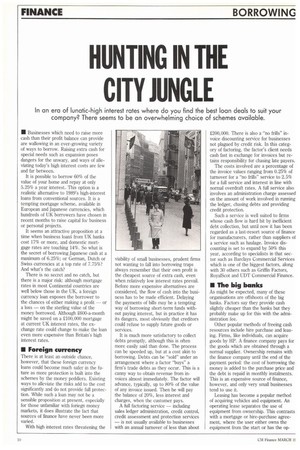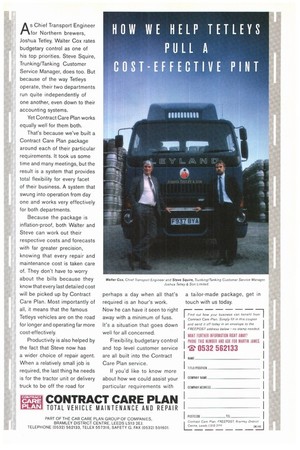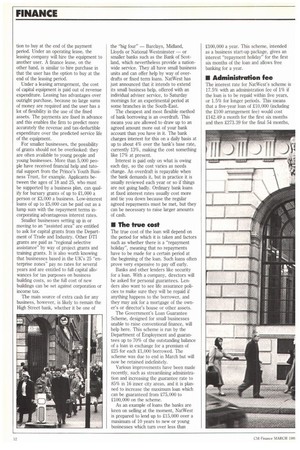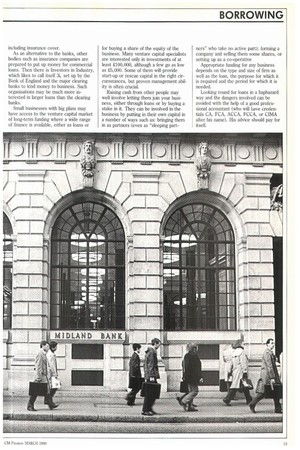HUNTING IN THE CITY JUNGLE
Page 122

Page 123

Page 124

Page 125

If you've noticed an error in this article please click here to report it so we can fix it.
• Businesses which need to raise more cash than their profit balance can provide are wallowing in an ever-growing variety of ways to borrow. Raising extra cash for special needs such as expansion poses dangers for the unwary, and ways of alleviating today's high interest costs are few and far between.
It is possible to borrow 60% of the value of your home and repay at only 5.25% a year interest. This option is a realistic alternative to 1989's high-interest loans from conventional sources. It is a tempting mortgage scheme, available in European and Japanese currencies, which hundreds of UK borrowers have chosen in recent months to raise capital for business or personal projects.
It seems an attractive proposition at a time when business loan § from UK banks cost 17% or more, and domestic mortgage rates are touching 14%. So what is the secret of borrowing Japanese cash at a maximum of 6.25%; or German, Dutch or Swiss currencies at a top rate of 7.75%? And what's the catch?
There is no secret and no catch, but there is a major risk: although mortgage rates in most Continental countries are well below those in the UK, a foreign currency loan exposes the borrower to the chances of either making a profit — or a loss — on the sterling value of the money borrowed. Although 2600-a-month might be saved on a .2100,000 mortgage at current UK interest rates, the exchange rate could change to make the loan even more expensive than Britain's high interest rates.
• Foreign currency
There is at least an outside chance, however, that these foreign currency loans could become much safer in the future as more protection is built into the schemes by the money peddlers. Existing ways to alleviate the risks add to the cost significantly and do not provide full protection. While such a loan may not be a sensible proposition at present, especially for those unfamiliar with foriegn money markets, it does illustrate the fact that sources of finance have never been more varied.
With high interest rates threatening the viability of small businesses, prudent firms not wanting to fall into borrowing traps always remember that their own profit is the cheapest source of extra cash, even when relatively low interest rates prevail. Before more expensive alternatives are considered, the flow of cash into the business has to be made efficient. Delaying the payments of bills may be a tempting way of borrowing short-term funds without paying interest, but in practice it has its dangers, most obviously that creditors could refuse to supply future goods or services.
It is much more satisfactory to collect debts promptly, although this is often more easily said than done. The process can be speeded up, but at a cost akin to borrowing. Debts can be "sold" under an arrangement where a factor "buys" a firm's trade debts as they occur. This is a canny way to obtain revenue from invoices almost immediately. The factor will advance, typically, up to 80% of the value of any invoice issued. Then he will pay the balance of 20%, less interest and charges, when the customer pays.
A full factoring service — including sales ledger administration, credit control, credit assessment and protection services — is not usually available to businesses with an annual turnover of less than about 2200,000. There is also a "no frills" invoice discounting service for businesses not plagued by credit risk. In this category of factoring, the factor's client needs cash fast in exchange for invoices but retains responsibility for chasing late payers.
The costs involved are a percentage of the invoice values ranging from 0.25% of turnover for a "no frills" service to 2.5% for a full service and interest in line with normal overdraft rates. A full service also involves an administration charge assessed on the amount of work involved in running the ledger, chasing debts and providing credit protection.
Such a service is well suited to firms whose cash flow is hard hit by inefficient debt collection, but until now it has been regarded as a last-resort source of finance for manufacturers, rather than suppliers ol a service such as haulage. Invoice discounting is set to expand by 50% this year, according to specialists in that sector such as Barclays Commercial Services which is one of the biggest factors, along with 30 others such as Griffin Factors, RoyalScot and UDT Commercial Finance.
• The big banks
As might be expected, many of these organisations are offshoots of the big banks. Factors say they provide cash slightly cheaper than the banks but they probably make up for this with the administration fee.
Other popular "methods of freeing cash resources include hire purchase and leasing. Firms, like individuals, can acquire goods by HP. A finance company pays for the goods which are obtained through a normal supplier. Ownership remains with the finance company until the end of the payment period: the cost of borrowing the money is added to the purchase price and the debt is repaid in monthly instalments. This is an expensive source of finance, however, and only very small businesses tend to use it.
Leasing has become a popular method of acquiring vehicles and equipment. An operating lease separates the use of equipment from ownership. This contrasts with a mortgage or hire-purchase agreement, where the user either owns the equipment from the start or has the op
As Chief Transport Engineer for Northern brewers, Joshua Tetley, Walter Cox rates budgetary control as one of his top priorities. Steve Squire, Trunking/Tanking Customer Service Manager, does too. But because of the way Tetleys operate, their two departments run quite independently of one another, even down to their accounting systems.
Yet Contract Care Plan works equally well for them both.
That's because we've built a Contract Care Plan package around each of their particular requirements. It took us some time and many meetings, but the result is a system that provides total flexibility for every facet of their business. A system that swung into operation from day one and works very effectively for both departments.
Because the package is inflation-proof, both Walter and Steve can work out their respective costs and forecasts with far greater precision, knowing that every repair and maintenance cost is taken care of. They don't have to worry about the bills because they know that every last detailed cost will be picked up by Contract Care Plan, Most importantly of all, it means that the famous Tetleys vehicles are on the road for longer and operating far more cost-effectively.
Productivity is also helped by the fact that Steve now has a wider choice of repair agent. When a relatively small job is required, the last thing he needs is for the tractor unit or delivery truck to be off the road for perhaps a day when all that's required is an hour's work. Now he can have it seen to right away with a minimum of fuss. It's a situation that goes down well for all concerned.
Flexibility, budgetary control and top level customer service are all built into the Contract Care Plan service.
If you'd like to know more about how we could assist your particular requirements with a tailor-made package, get in touch with us today.
Fed out how your business can benefit /r'] Contract Care Plan. Simply fill in this coupon and send It off today in an envelope to the FREEPOST address below no stamp needed.
tion to buy at the end of the payment period. Under an operating lease, the leasing company will hire the equipment to another user. A finance lease, on the other hand, is similar to hire purchase in that the user has the option to buy at the end of the leasing period.
Under a leasing arrangement, the cost of capital equipment is paid out of revenue expenditure. Leasing has advantages over outright purchase, because no large sums of money are required and the user has a lot of flexibility in the use of the fixed assets. The payments are fixed in advance and this enables the firm to predict more accurately the revenue and tax-deductible expenditure over the predicted service life of the equipment.
For smaller businesses, the possibility of grants should not be overlooked: they are often available to young people and young businesses. More than 5,000 people have received financial help and tutorial support from the Prince's Youth Business Trust, for example. Applicants between the ages of 18 and 25, who must be supported by a business plan, can qualify for bursary grants of up to £1,000 a person or £3,000 a business. Low-interest loans of up to £5,000 can be paid out as a lump sum with the repayment terms incorporating advantageous interest rates.
Smaller businesses setting up in or moving to an "assisted area" are entitled to ask for capital grants from the Department of Trade and Industry. Other DTI grants are paid as "regional selective assistance" by way of project grants and training grants. It is also worth knowing that businesses based in the UK's 25 "enterprise zones" pay no rates for several years and are entitled to full capital allo wances for tax purposes on business building costs, so the full cost of new buildings can be set against corporation or income tax.
The main source of extra cash for any business, however, is likely to remain the High Street bank, whether it be one of the "big four" — Barclays, Midland, Lloyds or National Westminster — or smaller banks such as the Bank of Scotland, which nevertheless provide a nationwide service. They all have small business units and can offer help by way of overdrafts or fixed term loans. NatWest has just announced that it intends to extend its small business help, offered with an individual adviser service, to Saturday mornings for an experimental period at some branches in the South-East.
The cheapest and most flexible method of bank borrowing is an overdraft. This means you are allowed to draw up to an agreed amount more out of your bank account than you have in it. The bank charges interest for this on a daily basis at up to about 4% over the bank's base rate, currently 13%, making the cost something like 17% at present.
Interest is paid only on what is owing each day, so the cost varies as needs change. An overdraft is repayable when the bank demands it, but in practice it is usually reviewed each year or so if things are not going badly. Ordinary bank loans at fixed interest rates usually cost more and tie you down because the regular agreed repayments must be met, but they can be necessary to raise larger amounts of cash.
• The true cost
The true cost of the loan will depend on the period for which it is taken and factors such as whether there is a "repayment holiday", meaning that no repayments have to be made for a certain period at the beginning of the loan. Such loans often prove very expensive to pay off early.
Banks and other lenders like security for a loan. With a company, directors will be asked for personal guarantees. Lenders also want to see life assurance policies to make sure they will be repaid if anything happens to the borrower, and they may ask for a mortgage of the owner's or director's house or other assets.
The Government's Loan Guarantee Scheme, designed for small businesses unable to raise conventional finance, will help here. This scheme is run by the Department of Employment and guarantees up to 70% of the outstanding balance of a loan in exchange for a premium of £25 for each £1,000 borrowed. The scheme was due to end in March but will now be retained indefinitely.
Various improvements have been made recently, such as streamlining administration and increasing the guarantee rate to 85% in 16 inner city areas, and it is planned to increase the maximum loan which can be guaranteed from £75,000 to £100,000 on the scheme.
As an example of loans the banks are keen on selling at the moment, NatWest is prepared to lend up to £15,000 over a maximum of 10 years to new or young businesses which turn over less than £100,000 a year. This scheme, intended as a business start-up package, gives an interest "repayment holiday" for the first six months of the loan and allows free banking for a year.
• Administration fee
The interest rate for Nat West's scheme is 17,5% with an administration fee of 1% if the loan is to be repaid within five years, or 1.5% for longer periods. This means that a five-year loan of £10,000 (including the £100 arrangement fee) would cost £142.49 a month for the first six months and then £273.39 for the final 54 months, including insurance cover.
As an alternative to the banks, other bodies such as insurance companies are prepared to put up money for commercial loans. Then there is Investors in Industry, which likes to call itself 3i, set up by the Bank of England and the major clearing banks to lend money to business. Such organisations may be much more interested in larger loans than the clearing banks.
Small businesses with big plans may have access to the venture capital market of long-term funding where a wide range of finance is available, either as loans or for buying a share of the equity of the business. Many venture capital specialists are interested only in investments of at least £100,000, although a few go as low as £5,000. Some of them will provide start-up or rescue capital in the right circumstances, but proven management ability is often crucial.
Raising cash from other people may well involve letting them join your business, either through loans or by buying a stake in it. They can be involved in the business by putting in their own capital in a number of ways such as: bringing them in as partners (even as "sleeping part ners" who take no active part); forming a company and selling them some shares, or setting up as a co-operative Appropriate funding for any business depends on the type and size of firm as well as the loan, the purpose for which it is required and the period for which it is needed.
Looking round for loans in a haphazard way and the dangers involved can be avoided with the help of a good professional accountant (who will have credentials CA, FCA, ACCA, FCCA, or CIMA after his name). His advice should pay for itself.




















































































































































